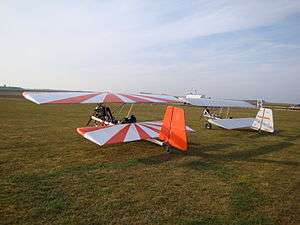APEV Pouchelec
The APEV Pouchelec (English: Ladder Flea Electric) is a French amateur-built electric aircraft, that was designed by Daniel Dalby and produced by APEV of Peynier. When it was available the aircraft was supplied as plans or as a kit for amateur construction.[1][2][3]
| Pouchelec | |
|---|---|
 | |
| A gasoline powered Pouchel (foreground) and a Pouchelec (background) | |
| Role | Amateur-built electric aircraft |
| National origin | France |
| Manufacturer | APEV |
| Designer | Daniel Dalby |
| Status | Plans and kits no longer available (2017)[1] |
| Unit cost |
€15,000 (including batteries and power train, 2011) |
| Developed from | APEV Pouchel Light |
Design and development
The Pouchelec is a development of the APEV Pouchel Light, adapted for electric power, including revised landing gear and longer span wings with greater surface area. The original Pouchel was constructed using three commercially available aluminium ladders, hence APEV is the Association pour la Promotion des Echelles Volantes, or in English, Association for the Promotion of Flying Ladders. Later models were forced to move to rectangular aluminium tubing when the ladder manufacturer grew concerned about liability. The Pouchel series are all derivatives of the classic 1930s Henri Mignet-designed Mignet Pou-du-Ciel (Flying Flea).[2][3][4]
The Pouchelec features a cantilever rear wing with a strut-braced parasol front wing, a single-seat open cockpit without a windshield, fixed conventional landing gear and a single engine in tractor configuration. The aircraft is made from bolted-together aluminum tubing, with its flying surfaces covered in Dacron sailcloth. Its 7.30 m (24.0 ft) span front wing and 5.30 m (17.4 ft) span rear have a combined area of 14.6 m2 (157 sq ft) and both employ NACA 23112 airfoils. The engine supplied is a 15 kW (20 hp) AGNI 119R electric motor powered by a Kokam Lithium-ion polymer battery pack, which gives a 30-minute flight endurance.[2][3][4]
As of late 2017 it was no longer listed as available as plans or a kit.[1]
Operational history
Bayerl et al. describe the aircraft in flight as "wonderfully quiet".[2]
Specifications (Pouchelec)
Data from Bayerl and APEV[2][4]
General characteristics
- Crew: one
- Upper wingspan: 7.30 m (23 ft 11 in)
- Lower wingspan: 5.30 m (17 ft 5 in)
- Wing area: 14.6 m2 (157 sq ft)
- Airfoil: NACA 23112
- Empty weight: 140 kg (309 lb) including batteries
- Gross weight: 250 kg (551 lb)
- Powerplant: 1 × AGNI 119R electric motor powered by a Kokam Lithium-ion polymer battery pack, 15 kW (20 hp)
Performance
- Maximum speed: 120 km/h (75 mph, 65 kn)
- Cruise speed: 70 km/h (43 mph, 38 kn)
- Stall speed: 35 km/h (22 mph, 19 kn)
- Never exceed speed: 120 km/h (75 mph, 65 kn)
- Endurance: 30 minutes
- g limits: +4/-2
- Wing loading: 17.1 kg/m2 (3.5 lb/sq ft)
References
- APEV. "Get the plans and kits". www.pouchel.com. Retrieved 14 January 2018.
- Bayerl, Robby; Martin Berkemeier; et al: World Directory of Leisure Aviation 2011-12, page 93. WDLA UK, Lancaster UK, 2011. ISSN 1368-485X
- Tacke, Willi; Marino Boric; et al: World Directory of Light Aviation 2015-16, page 97. Flying Pages Europe SARL, 2015. ISSN 1368-485X
- APEV. "The Pouchelec, the electric Pouchel". Retrieved 19 September 2012.
External links
| Wikimedia Commons has media related to Pouchel. |